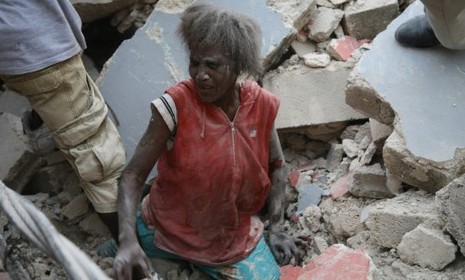Haiti coverage: 'Disaster porn'?
The U.N. says wall-to-wall media coverage of Haiti's earthquake has become too sensationalist — and is distorting the truth

A free daily email with the biggest news stories of the day – and the best features from TheWeek.com
You are now subscribed
Your newsletter sign-up was successful
United Nations officials in Haiti and other observers say the foreign media is sensationalizing the earthquake aftermath to boost ratings, exaggerating looting reports while underreporting the relief efforts and the millions of Haitians who've remained calm. Critics also single out "TV news personalities," such as CNN's Anderson Cooper and Dr. Sanjay Gupta, alleging that they've thrust themselves into the story, participating in rescues and caring for the injured, to ensure more exciting coverage. Is the media covering the disaster responsibly, or exploiting it?
CNN's wall-to-wall coverage is pornographic: Even though Haiti's impoverished majority have battled hunger and deprivation for decades, says journalist Marc Cooper in his blog, CNN didn't think "the daily pre-earthquake deaths" and starvation were newsworthy. Now, it is making sure the world sees that its correspondents holding the Haitian people's hands, and overhyping the chaos. This isn't journalism. It's "disaster porn."
"CNN hits pay dirt: AC to the rescue!"
The Week
Escape your echo chamber. Get the facts behind the news, plus analysis from multiple perspectives.

Sign up for The Week's Free Newsletters
From our morning news briefing to a weekly Good News Newsletter, get the best of The Week delivered directly to your inbox.
From our morning news briefing to a weekly Good News Newsletter, get the best of The Week delivered directly to your inbox.
A catastrophe this big deserves heavy coverage: Journalists who focus too much on violence, death, and destruction should be censured, says Hal Boedeker in The Orlando Sentinel. But the Haiti catastrophe, "one of the greatest of our time," is something the world has to see. "People are being pulled from the rubble alive after the earthquake. That’s inherently dramatic, and I’ve seen a lot of fine reporting across the board, on cable news, broadcast news, and local news."
"Too much Haiti coverage? Listen to Shepard Smith"
The looting coverage is definitely over-the-top: Is it really considered "looting" when you're doing "what you must to feed your family when your nation is in ruins?" says Jerry Lanson in True/Slant. From what I understand, most Haitians "have been remarkably restrained, helping their neighbors, desperately trying to move concrete with their hands as corpses lie in the streets." Yet looting is the big story.
A free daily email with the biggest news stories of the day – and the best features from TheWeek.com
The coverage has been riveting, and in some cases life-saving: Reporters, "at times visibly shaken," have done more than point out piles of corpses, says Joanne Ostrow in The Denver Post. They’ve identified spots where aid was bottlenecked. And poignant "star turns" by the likes of Anderson Cooper and Sanjay Cooper have revealed them "as humans first, journalists second, a signal to viewers around the world of just how overwhelming the damage is."
"Haiti disaster overwhelming on TV"
..........................................
SEE MORE OF THE WEEK'S HAITI COVERAGE:
• Haiti: Is the U.S. doing enough?
• Is Wyclef's Haiti charity a scam?